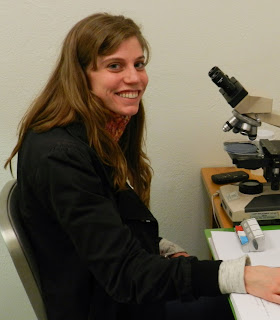BAHS Alumna Feature-Sarah Monaco
 Sarah Monaco, B.S. Biology, spring 2012, graduated on May 15 with a M.S. in Neuroscience from Drexel University College of Medicine.While at BU, Sarah conducted research with Dr. George Chamuris on basidiospore germination and bark texture preference of bark-inhabiting fungi. At Drexel, Sarah's thesis was entitled "GSK3β influences NMDA receptor expression by regulating β-catenin abundance in prefrontal cortical neurons" and was under the direction of major advisor Dr. Wen-Jun Gao. Sarah shares the following about her experience:
Sarah Monaco, B.S. Biology, spring 2012, graduated on May 15 with a M.S. in Neuroscience from Drexel University College of Medicine.While at BU, Sarah conducted research with Dr. George Chamuris on basidiospore germination and bark texture preference of bark-inhabiting fungi. At Drexel, Sarah's thesis was entitled "GSK3β influences NMDA receptor expression by regulating β-catenin abundance in prefrontal cortical neurons" and was under the direction of major advisor Dr. Wen-Jun Gao. Sarah shares the following about her experience:
As a neuroscience master's student at Drexel University College of Medicine my research focused on cell signaling pathways relevant for cognition, with a particular interest in schizophrenia. I utilized primary neuronal cultures, pharmacological treatment, and Western blotting techniques to: 1) elucidate the sequence of events in a cellular signaling mechanism 2) determine what leads to NMDA receptor expression upregulation and down regulation, and 3) identify potential therapeutic targets for the treatment of disorders afflicted with cognitive impairments. My project helps the laboratory in our larger goal of understanding what controls cellular components important for cognition, particularly within the prefrontal cortex. From this study, we hope to further the field in determining the best cellular component to target in order to specifically increase NMDA receptor expression as a means to improve cognition in disorders such as schizophrenia. Overall my research found that GSK3β activity influences gene transcription of NR2A, with effects mediated by β-catenin availability.
My first year of graduate school started off difficult, trying to find my niche both academically as well as socially. I spent the majority of my time studying for courses, with the rest spent gaining experience in an independent laboratory setting. I started to make close friends in my program, pushing ourselves as well as each other to be better students; I slowly began acquiring confidence in my scientific thinking. Now after 2 and a half years, I can proudly say that I have been shaped into an intelligent, hard-working, analytical, creative, and independent-thinker. There were several challenging days, but graduate school has molded me into my best self; I am not only a better person scientifically speaking, but a better person as a whole.


